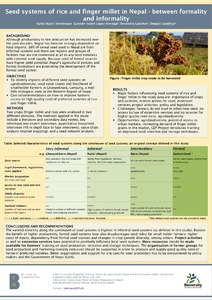Resource information
In Nepal, more than 90% of cereal seed flows from informal systems and there are regions and groups of farmers that are not connected at all to any seed networks with external seed supply. Nepal's agricultural policies and formal institutions are promoting the development of the formal seed system. However, knowledge gaps exist on the opportunities and challenges for smallholder farmers when formal seed systems are becoming accessible. This study identified impacts of different seed systems on agrobiodiversity, seed value chains and livelihood of smallholder farmers in Ghanpokhara, a mid-hill region of Nepal.
A survey was conducted in 40 farm households (rice and finger millet), numerous key informants and experts involved in Nepal's seed systems were interviewed and extensive literature review was done. Four different seed systems were identified: the formal system, the intermediary system, the informal system and the no seed supply system (except local seeds). The latter was found in Ghanpokhara for rice and finger millet. Although (seed and crop) markets can be found not too far away, farmers in the study site appear to be locked off from the formal seed system. Their interest to purchase new seed seems to be high, but their awareness about potential benefits of quality seed is low, and they have limited access to information and new seed. The present research also found that varietal diversity along the continuum of seed systems is highest in informal seed systems. Besides numerous benefits, increasingly formal seed systems bear also disadvantages (and risks) for small-holder farmers: higher costs of input, dependency from formal seed sources and changes in crop genetic diversity, among others.
The recommendations derived from this study are: extension service should be promoted in remote areas, more resources should be made available for farmers' training on seed production, selection and storage techniques. Furthermore, the organisation in farmer groups for seed production should be facilitated (socially inclusive) in order to produce good quality seed of farmer preferred varieties locally and in sufficient quantity.


